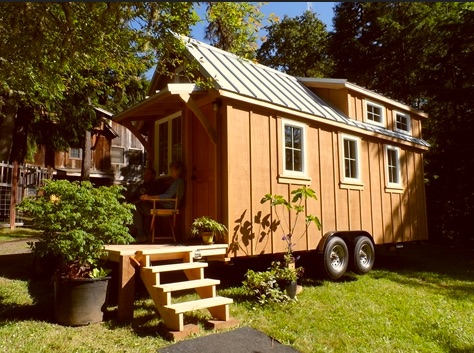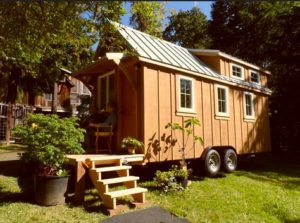The Small House Specialty Code Superseded And Replaced The Reach Code
Oregon -HB 2423, created the Small Home Specialty Code (consisting of the 2018 International Residential Code, including but not limited to Appendix Q of that code), superseded and replaced all previous related statutes and approaches in the ORSC, including the R329 ORSC amendments (temporary rule) and the REACH code.
The State Building Codes Division (BCD) adopted the 2018 International Residential Code, including Appendix Q, as part of the Oregon Reach Code to provide minimum standards for the construction of tiny houses (400 square feet or less, not including loft areas). Appendix Q became effective on Sept. 20th, 2018.
Builders Are Encouraged To Work With Local Jurisdiction
The new Small Home Specialty Code is the recognized construction standard for all permanent dwellings 400 sq. ft. or less in Oregon. As part of that recent legislation, the legislature made it clear that these issues are local jurisdiction issues. Builders are encouraged to work with their local planning and development departments to make sure any issues or potential confusion can be worked out with the jurisdiction. The local jurisdiction is the best resource for any and all local requirements and policies.
Small House Specialty Code: Effective Date October 1st, 2019
”Small House Specialty Code” – Means the specialty code adopted under section 2 of this 2019 act. It means a code of regulations adopted under ORS 446.062, 446.185, 447.020 (2), 455.020 (2),455.496, 455.610, 455.680, 460.085, 460.360, 479.730 (1) or 480.545 or section 2 of this 2019 Act.
Oregon Regulation Of RVs And Park Models: SB410 Anf HB2333: Effective January 1st, 2020
Last week, Oregon Governor Kate Brown signed into law a bill that eliminates the Department of Consumer and Business Services from regulating RVs. With the enactment of this new law, the need to attach an additional and duplicative Oregon insignia of compliance or seal to RVs is eliminated and Oregon joins the vast majority of states which do not regulate the manufacturing of RVs. Additionally, the new law removes the requirement for PMRV manufacturers in the state of Oregon to use licensed plumbers and licensed electricians to make installations and repairs. The bill, OR SB 410, takes effect on January 1, 2020.
The changes the new law implements are common sense and help promote not only the national RV industry but also the Oregon RV industry which contributed $4.3 billion in economic impact and supported almost 23,000 jobs in the state of Oregon.
In addition to SB 410, another bill, OR HB 2333, was passed unopposed by the Oregon state legislature. This bill defines RVs and PMRVs as vehicles under the regulation of the Oregon Department of Transportation. HB 2333 is awaiting a signature from Governor Brown and we expect this to happen in the coming days or weeks.
The RV Industry Association would like to thank all the legislators and officials who contributed to the successful passage of both SB 410 and HB 2333. Special thanks to Senator Lee Beyer on his work to pass SB 410, and special thanks to Representative Duane Stark, Representative Greg Barreto, Representative Paul Holvey, and the other sponsors of HB 2333.
SB 410 Eliminates Department Of Consumer And Business Services Regulation Of Recreational Vehicle Construction.
Eliminates general definition of recreational vehicle for purposes of manufactured structure construction statutes. Creates a substitute definition of recreational vehicle for use in certain statutes outside manufactured structure construction statutes. Eliminates department regulation of recreational structure construction.
Eliminates department regulation of construction and installation of yurts on campgrounds for use as transitional housing.
Revises requirements for prefabricated structures that cease to qualify for exclusion from state building code regulations. Preserves, for land use law purposes, existing definitions of shared terms affected by state building code exclusions. Expands types of structures intended for out-of-state delivery exempted from the plan review, inspection, electrical, plumbing, or other state building code requirements.
Oregon HB 2333 Relating To Recreational Vehicles
Oregon Revised Statute (ORS) 197.493: Placement And Occupancy Of Recreational Vehicle
1) A state agency or local government may not prohibit the placement or occupancy of a recreational vehicle, or impose any limit on the length of occupancy of a recreational vehicle, solely on the grounds that the occupancy is in a recreational vehicle if the recreational vehicle is:
(a) Located in a manufactured dwelling park, mobile home park, or recreational vehicle park;
(b) Occupied as a residential dwelling; and
(c) Lawfully connected to water and electrical supply systems and a sewage disposal system.
(2) Subsection (1) of this section does not limit the authority of a state agency or local government to impose other special conditions on the placement or occupancy of a recreational vehicle. [2005 c.619 §12]
Note: See note under 197.492 (Definitions for ORS 197.492 and 197.493).
Article Source Oregon Laws.Org
Portland: Guidelines for Occupied RVs and Tiny Homes on Wheels on Private Property
Below you will find the requirements for parking an occupied RV or tiny home on wheels on private property, including:
number and type of vehicles allowed, parking, sanitation, electricity, and length of stay
You may have an occupied RV or tiny home on wheels on private property if you meet the following requirements:
1. Number and Type of Vehicles Allowed
Occupied vehicles must be designed for temporary living.
On commercial properties: up to three vehicles.
On single-family or duplex residential properties: one vehicle maximum.
On multi-family apartment properties and vacant lots: no occupied vehicles allowed.
2. Parking Guidelines
The property must have a legal location to park the occupied vehicle. Vehicles parked in the street may not be occupied.
If motorized, the vehicle must be parked on a paved surface.
If non-motorized, the vehicle may be parked on unpaved surfaces.
RVs and tiny homes on wheels must be parked behind the front façade of the dwelling.
Call Planning and Zoning at (503) 823-7526 to confirm legal locations to park on your property.
3. Sanitation
Sanitary facilities must be available at the site. The owner of the property must subscribe to and pay for garbage, recycling, and composting services.
The owner of the property may allow access to the permanent facilities inside the dwelling.
Wastewater of any kind may not be disposed of on the ground or into existing drains or sewer lines.
Mobile or off-site pumping services must be employed if a holding tank is used.
Greywater systems that release wastewater from sinks or showers to disperse underground may be installed with a plumbing permit.
Holding tanks may not be emptied via temporary piping to existing on-site sanitary sewer systems. Permanent dump stations may be installed on property with a plumbing permit.
Portable toilets may be used on commercial property in parking lots only.
4. Electricity
Generators are not allowed.
Extension cords can be used to connect to a properly rated and approved receptacle outlet.
Extension cords should be adequately protected where they are subject to physical damage such as in driveways and walkways.
Vehicles may not be hard-wired to electrical service.
Permanent electrical service “pedestals” for an exterior receptacle outlet may be installed with an electrical permit.
5. Length of Stay
Rentals of less than 30 days are not allowed in RVs and tiny homes
Helpful Safety Tips
- Create as much fire separation distance as possible between the dwelling and the occupied vehicle.
- Keep three feet between electric space heaters and belongings.
- Don’t smoke inside vehicles.
- Install and maintain fire extinguishers, smoke detectors, and carbon monoxide detectors.
- Make sure propane tanks are in proper working order. Store tanks outside of the living space.
- Sewer gases can be harmful to health. If holding tanks are being used, have them serviced regularly. Check for leaks along the outside of the tank and at fittings.
- Freshwater supply tanks should be disinfected regularly and filtered before drinking.
Be a Good Neighbor
- Be courteous with off-street parking.
- Keep noise levels down, especially at night and in outdoor areas.
- Make sure vehicles are parked legally.
- Property owners should establish clear rules for renters.
- Look after pets and clean up behind them.
Complaints
If the city receives a complaint and verifies that any of the requirements listed are not being met, citations will be issued. Property owners will have 30 days to comply. Monthly enforcement fees will be assessed if violations are not corrected.
Please call (503) 823-2633 to report a concern about camping on private property.
Call (503) 823-4000 to report occupied vehicles in the street.
Other Resources
Utility assistance and housing referrals: 2-1-1
Linking property owners needing roommates with home-seekers: Metro Home Share (971) 271-5195
Home repair assistance: Reach Community Development (503) 231-0682
Free mediation of neighborhood conflict: Resolutions Northwest (503) 595-4890
Update On Portland: Dec. 22nd, 2020
Breaking Tiny House News: Portland, Oregon: Portland To Allow Tiny Houses On Wheels As An ADU
THOWs Allowed In Outdoor Shelters, Church Parking Lots And RV And Mobile Home Parks
Tiny Home Regulation: Background Brief
Tyler LarsonLegislative Policy and Research Of****************************@***************re.govPlease note that the Legislative Policy and Research Office.
Please note that the Legislative Policy and Research Office provides centralized, nonpartisan research and issue analysis for Oregon’s legislative branch. The Legislative Policy and Research Office does not provide legal advice. Background Briefs contain general information that is current as of the date of publication. Subsequent action by the legislative, executive, or judicial branches may affect accuracy.
Tiny Home Regulation Background Brief



Pingback: Jurisdictions Allowing Tiny Houses -